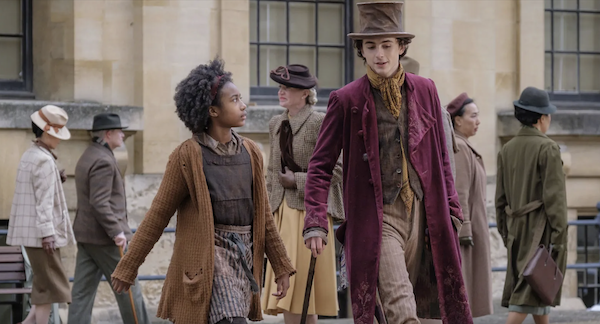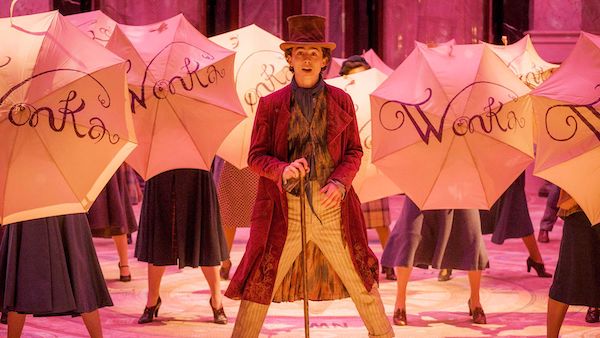Film Review: “Wonka” — Chocolate, Sweet and Dark
By Peg Aloi
In a world that at times seems to have turned sour and colorless, Wonka brings much needed sweetness and beauty, making it a perfect diversion for the holiday season.
Wonka, directed by Paul King. Screening at AMC Boston Common 19, the Alamo Drafthouse Cinema Boston Seaport, and other movie houses throughout New England.

Calah Lane and Timothée Chalamet in Wonka.
Like many viewers of my generation, perhaps, who grew up watching 1971’s Willy Wonka and the Chocolate Factory, which starred the unforgettable Gene Wilder as the mysterious, clever, insouciant Willy Wonka, I didn’t feel the need for an origin story. The scene where the five golden ticket winners arrive at Wonka’s castle and its candy-colored compound, where the legendary chocolatier appears to the public for the first time in years, reveals an iconoclastic and extraordinarily wealthy hermit. At first, he walks stiffly with a cane — then he suddenly falls forward into a limber somersault, catching his purple top hat in his hand. What more did you ever need to know about this man, who was full of so many secrets and surprises that he was as irresistible as the rainbow-hued sugary treats that formed the (literal) building blocks of his empire.
But Hollywood loves a retread, doesn’t it? And everyone, myself included, loves Timothée Chalamet. So, when it was announced he would be playing Willy Wonka in this new musical version of the Roald Dahl story, many people were overjoyed. After all, the only other retread of the story in recent years (Tim Burton’s Charlie and the Chocolate Factory in 2005) featured a rather creepy, over-the-top characterization by Johnny Depp, who admitted his version of Willy Wonka contained elements of Fred Rogers from Mister Rogers’ Neighborhood.
Of course, Chalamet is clearly too young to play Willy Wonka at the stage of life that was portrayed by Gene Wilder. At that point he is a man who decides to take an enormous risk by holding a worldwide competition to search for a child who might inherit his business and brand. In director Paul King’s Wonka, Willy Wonka is a youthful soul full of childlike hope and wonder. In the opening scene, a lithe, acrobatic Willy Wonka scampers up the mast of a huge ship where he has served as a well-loved chef. As the ship docks in a busy port, he dances into this new city, which at times resembles what could be described as a rather Dickensian-looking Oxford (where some scenes were filmed, as well as in Bath and London). The Victorian setting works well to establish the film’s central theme — this will be a story about overcoming poverty and the corrupting power of greed. With 12 sovereigns in his pocket, Willy Wonka announces (Via song! It’s a musical!) to everyone in earshot that he will make his fortune selling chocolate. He has an apparently endless supply of the confection in large glass jars that he pulls from his magical cocoa-colored top hat.
Before the song even ends, however, Willy finds himself flat broke. He can’t even pay for a room for the night. A rough-looking man named Scrubbit leads the guileless Willy to a large rooming house attached to a laundry (Scrubbit & Bleachers) where Mrs. Bleacher, a motherly type played with delicious evil glee by Olivia Colman, offers to give him a room that he can pay for tomorrow. A savvy young waif (excellent newcomer Calah Lane) pokes her head out from the shadows; she tells Willy to read the fine print on the contract Mrs. Bleacher forces him to sign. The bottom line: he is bound to indentured servitude until he can pay off an enormous debt. The next day he finds himself working long and arduous hours in Bleacher’s huge laundry business alongside similarly luckless individuals, including Noodle, the young waif who tried to warn him. It’s an absurd premise, but one that underscores the inescapable nature of poverty and the calculated cruelty of the rich.
Willy is undeterred in his quest to bring his magically delicious chocolate to the people. But he soon learns that there are other mean and cruel rich people in town, namely an unholy Trinity of chocolate makers named Slugworth, Fickelgruber, and Prodnose (played by Paterson Joseph, Matthew Baynton, and Little Britain’s Matt Lucas). Their product is substandard, but they’ve cornered the market and turned the local constabulary into their hired thugs, including the chief of police (Keegan-Michael Key), who lets his addiction to sweets compromise his integrity. Willie bonds with his new friends in the laundry (especially Noodle, an orphan whose pragmatic demeanor is softened by Willy’s infectious creativity). He enlists them to help him sell his chocolates, so that he, in turn, can enable them to escape their servitude. Needless to say, anyone who tastes Willy Wonka’s magical chocolates (described in delightful songs and consumed in scenes full of whimsy and imagination that includes a friendly CGI giraffe named Abigail) is immediately smitten. Before long Willy has begun to make some good money with his pop-up chocolate shop. But the greedy villains do their best to keep him down.

A dance number featuring Timothée Chalamet in Wonka.
Lest you think there are no Oompa-Loompas in this origin story, there is one, and one is enough, because he is played by Hugh Grant, whose comic brilliance can’t be diminished by intricate CGI effects that shrink him to the size of a house cat. Willy must make amends with this Oompa-Loompa before the two can form a partnership, and these interactions are comedy gold, thanks to Grant’s irrepressibly naughty demeanor. Chalamet brings his usual mischievous charm to the role; and he turns out to be a very fine singer and dancer. The cast includes wonderful cameos from Brit luminaries including Rowan Atkinson, Jim Carter, and Sally Hawkins. The assemblage of villainous varlets supply some great scenery chewing: their coldhearted evil adds considerable melodramatic power to a redemptive story arc in which kindhearted Willy Wonka and his friends prevail in the end.
The plot of this confection has many strands (like colorful ribbon candy) so the proceedings are lively and fresh throughout. The score’s rather catchy songs, composed by Neil Hannon, with lyrics co-written by Paul King and Simon Farnaby (who adapted the screenplay, and who also co-wrote Paddington 2 with King) are performed flawlessly. The real star of the show might be its dizzying special effects: thrilling dance numbers take place on magical confectionary sets in impossible locations. The production design is glorious; the impressive visuals straddle storybook fantasy and authentic period detail. Veteran British costume maven Lindy Hemming’s costume design — apart from Willy’s rather Gothic magenta velvet frock coat — features a stunning array of candy colors, mostly shades of chocolate from pastel to dark. Lovers of the original film (and who doesn’t love it?) will notice a few clever and even subtle homages. On top of that nostalgia, there’s a wistful quality to the film’s pervasive theme of imagination serving as both a balm in troubled times and an essential catalyst for change. In a world that at times seems to have turned sour and colorless, Wonka brings much needed sweetness and beauty, making it a perfect diversion for the holiday season.
Peg Aloi is a former film critic for the Boston Phoenix and member of the Boston Society of Film Critics, the Critics Choice Awards, and the Alliance for Women Film Journalists. She taught film studies in Boston for over a decade. She writes on film, TV, and culture for web publications like Time, Vice, Polygon, Bustle, Mic, Orlando Weekly, and Bloody Disgusting. Her blog “The Witching Hour” can be found on substack.


…PEG ALOI…So Enjoy Your Movie Reviews…Must Review Into Perpetuity…